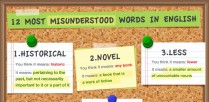Anyway or anyways?
“Anyway,” “anyways” and “any way”: which are proper, and how should they be used? Some rules, examples and an infographic will help to sort everything out.
Click here to download high resolution poster.
Anyway or Anyways?
These words give headaches to folks fond of English grammar. “Anyways” is not acceptable; it is an adverb, and adverbs cannot be plural. Despite this, “anyways” is heard everywhere, and even a dictionary or two have caved to those who insist on using it. The fight is fierce, and people even report returning job applications because they spotted an “anyways.” The television carries a lot of the blame; few people speak with perfect grammar, so television is not an authority on speaking and writing. English evolves, and rules can shift to accommodate the desires of those who speak it, so it would not be surprising if “anyways” becomes completely acceptable in the future. For now, though, use “anyway.”
“Anyway” is descended from “any way.” It means “regardless” and is used to show that something is occurring in spite of something else.
“I am full but will eat dessert anyway.”
“Bob is not fond of jellybeans but ate them anyway.”
“Anyway” can also be used to forcefully redirect a conversation and is a nice tool to bring a discussion back on track when it has wandered away. The following dialogue shows how this works.
“There’s a platypus in the backyard,” said Amy.
Bill hung his coat and turned to stare at his wife. “A what?”
“A platypus. I just found a website about them on the internet. It says they are mammals that lay eggs: ‘monotremes.’ How weird is that? Also, the males have venomous spurs on their legs.”
Bill continued to stare at her.
“Apparently, the venom won’t kill you (it’s used for fighting other males), but it hurts a LOT, and the wound from the spur itself can lead to a really nasty infection. Anyway, there’s a platypus in the backyard.”
“Any Way”
This pair of words is simply a noun modified by an adjective and is read literally, but it is also a fine example of words that can develop deeper meaning when used together. The literal meaning is “in any manner, direction or course,” but the pair can also be used to signal an emphasis on determination (as in the third example). This idiomatic aspect is probably due to the drama of the pair’s superlative qualities (“all,” “none,” “in any way,” “in no way”).
“I do not like crocodiles and will not associate with them in any way.”
“Any way you go from here, you will eventually come to a road.”
“Bubba was on a search for candy; I swore to help him in any way I could.”
The flip side would be “no way/in no way.” Also very idiomatic, if someone says they are “in no way interested,” you can be sure that they are completely uninterested.
“‘I will in no way let you pass,’ said the gate guard.”
You are NOT getting through.
“Myrtle thought Arnold was a slob and would in no way date him.”
Even without the word “slob,” “in no way” makes this statement powerful. Myrtle would probably rather date a troop of monkeys.
The war over “anyway” and “anyways” is fiery. What is your opinion?



![10 Confusing Homonyms: Part II [infographic]](https://www.grammar.net/wp-content/uploads/2013/07/homonyms-2_small-308x95.png)
![Dashes, semicolons and colons [infographic]](https://www.grammar.net/wp-content/uploads/2013/08/DashesSemicolorsColors-web-308x95.jpg)


